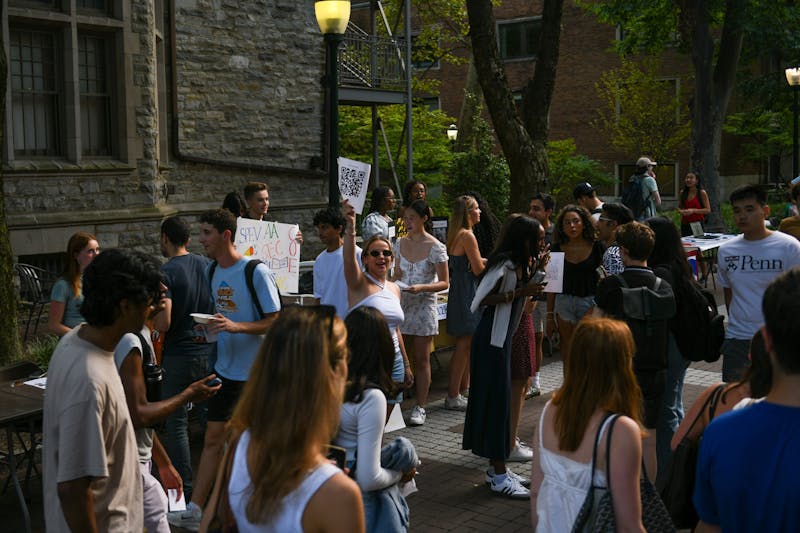
The Annenberg Public Policy Center released a film titled “The Eighth Amendment: Cruel and Unusual Punishment” on Annenberg Classroom in recognition of Constitution Day on Sept. 17.
The 24-minute film depicts the origins of the Eighth Amendment and how sentences considered appropriate have changed over time, specifically in regard to the juvenile justice system. It is part of a series of nearly 70 educational documentaries about the Constitution of the United States available on Annenberg Classroom, which provides free materials to inform the public about civics.
The new film was screened at Eastern State Penitentiary on Constitution Day, where a panel of experts discussed the documentary’s themes.
Director of Outreach and Curriculum for the Leonore Annenberg Institute for Civics Andrea Reidell said that while many people focus on First Amendment freedoms, she wanted to release a film highlighting the Eighth Amendment's prohibition of "cruel and unusual punishment."
Former Chief Justice Earl Warren first coined the term “evolving standards of decency” in 1958 to justify changes to law alongside societal norms. In particular, the Annenberg Classroom film examines the evolution of the death penalty for juvenile offenders.
“There was a point at which the idea of adolescence wasn't as well known, and so juveniles were treated as adults,” Reidell said. “It wasn't until scientists began looking at brain development in teenagers that they could say, hold on: maybe they shouldn't be as responsible for what they're doing, because their brain is different than an adult brain.”
Reidell put together a panel to foster conversation about the film at the Eastern State Penitentiary screening. Chief Legal Officer at Juvenile Law Center Marsha Levick, who is also a 1971 College graduate and University of Pennsylvania Carey Law School adjunct professor, spoke on the panel.
Levick noted that everyone who participated in the film — which was made prior to the COVID-19 pandemic — was “optimistic and spoke positively” about how the Supreme Court of the United States has strengthened the Eighth Amendment’s protection against cruel and unusual punishment over time.
“Continuing to ensure that our laws in this country reflect the unique developmental status of children means that we should also have a legal status for children that matches that developmental status,” she said.
Senior Policy Associate with Families Against Mandatory Minimums Bryan Widenhouse, who has worked to change the narrative around extreme sentences, also spoke on the panel. Widenhouse emphasized his belief in everybody’s capacity for rehabilitation in an interview with The Daily Pennsylvanian.
“Everybody has an ability to be immature and impulsive,” Widenhouse said. “It doesn't matter what your capacity for rehabilitation is, it matters what you do with it.”
However, he said that he disagrees with the picture of “evolving standards of decency” painted in the documentary.
“We never asked the question, is this or is this not cruel?” Widenhouse said. “I don't subscribe to the measure of evolving standards of decency based on how many people are or are not doing it. We should approach it as: is it right or is it wrong?”
Widenhouse described how his own past led him to the field he works in today.
“In 1989, I was two months into my 17th birthday, committed a crime, and received life without parole sentences because of that,” he said. “Through my own self advocacy, journey to redemption, and belief that people can and do change, I came to the realization that there comes a time when a second look needs to really be considered if the original sentence is still merited.”
Roughly 2,800 people were serving juvenile life without parole sentences in 2012, and 1,124 people have been released from their sentences since 2016. Since then, the recidivism rate has remained low, with fewer than 100 people released having been resentenced to life without parole.
Both panelists shared their varied approaches to making progress and changing minds.
“Over time, litigation before state supreme courts could reflect a whole new national consensus on issues and the Supreme Court might have to acknowledge that this country had moved in that direction,” Levick said.
When asked about his message to student activists, Widenhouse urged those with an interest in making a change to do so. He referenced a quote by American anthropologist Margaret Mead, who said, "Never doubt that a small group of thoughtful committed individuals can change the world. In fact, it's the only thing that ever has."
“If you know that this is right, and you believe in changing wrongs to right, it doesn't matter what the opposition is," Widenhouse said.
Reidell said that she plans to continue promoting the film in a few major cities and with the Penn community in the upcoming months. The film will continue to be showcased regionally, with a panel at Penn in the spring. More information will be released about screenings and future panels in February and in March during Civic Learning Week from March 10-14.
Senior Reporter Neema Baddam contributed reporting.
The Daily Pennsylvanian is an independent, student-run newspaper. Please consider making a donation to support the coverage that shapes the University. Your generosity ensures a future of strong journalism at Penn.
Donate






